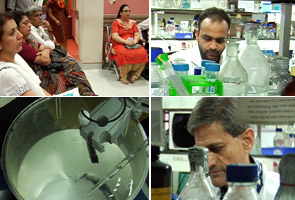A diabetes breakthrough from India
Pallava Bagla, Updated: July 13, 2010 09:33 IST
New Delhi: A team of Indian scientists has discovered a novel form of insulin that could drastically reduce the suffering diabetics face in controlling their blood sugar.
For the diabetics, daily painful pinpricks to inject doses of insulin is a routine affair, now in a new discovery scientists claim a single shot of insulin could help keep sugar levels under control for more than a month. Today the effect of each insulin injection lasts at best for a day.
India is considered the diabetes capital of the world, with as many as 50 million people suffering from this chronic disease, so any new discovery is welcomed with open arms.
The team spent 2 million rupees and took two years to come with this novel solution. These scientists have already patented the technology, commercialized it and the new insulin could well become a big money spinner in times to come, feels the man who discovered this new form of insulin.
"It is a multi-million dollar technology transfer agreement with royalties once the product goes to the market and if I am not wrong it is one of the biggest scientific innovations to have come from a government owned research laboratory," said Professor Avadhesha Surolia, Director, National Immunology Institute, New Delhi.
Imagine having to do away with multiple injections everyday to control the sugar problem. The simplicity of the discovery and its huge potential has attracted immediate attention.
"Both conceptually and for clinical practice it is an exciting discovery because it uses natural chemically unchanged insulin and clinically it is useful because it provides ease for patients by reducing the number of pin pricks," said Dr Ambrish Mithal, Diabetologist and president, Endocrine Society of India.
I
The new insulin molecule discovered by Indians in India could become a blockbuster drug in times to come as it holds a lot of promise, currently being tested on animals like on rats, it will soon undergo human trials and then it may become available as drug for the treatment of diabetes.
For the diabetics, daily painful pinpricks to inject doses of insulin is a routine affair, now in a new discovery scientists claim a single shot of insulin could help keep sugar levels under control for more than a month. Today the effect of each insulin injection lasts at best for a day.
India is considered the diabetes capital of the world, with as many as 50 million people suffering from this chronic disease, so any new discovery is welcomed with open arms.
The team spent 2 million rupees and took two years to come with this novel solution. These scientists have already patented the technology, commercialized it and the new insulin could well become a big money spinner in times to come, feels the man who discovered this new form of insulin.
"It is a multi-million dollar technology transfer agreement with royalties once the product goes to the market and if I am not wrong it is one of the biggest scientific innovations to have come from a government owned research laboratory," said Professor Avadhesha Surolia, Director, National Immunology Institute, New Delhi.
Imagine having to do away with multiple injections everyday to control the sugar problem. The simplicity of the discovery and its huge potential has attracted immediate attention.
"Both conceptually and for clinical practice it is an exciting discovery because it uses natural chemically unchanged insulin and clinically it is useful because it provides ease for patients by reducing the number of pin pricks," said Dr Ambrish Mithal, Diabetologist and president, Endocrine Society of India.
I
The new insulin molecule discovered by Indians in India could become a blockbuster drug in times to come as it holds a lot of promise, currently being tested on animals like on rats, it will soon undergo human trials and then it may become available as drug for the treatment of diabetes.
Story first published:
July 13, 2010 00:19 IST

 Click to Expand & Play
Click to Expand & Play
No comments:
Post a Comment